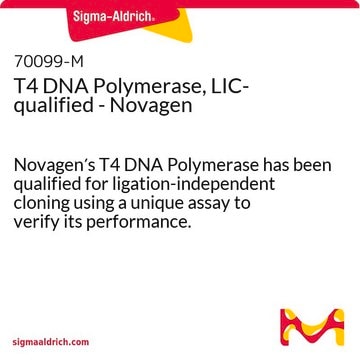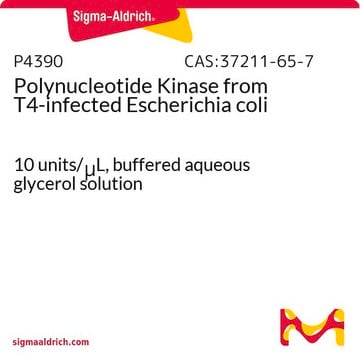T4PNK-RO
Roche
T4 Polynucleotide Kinase, 3′-phosphatase free
from phage T4 am N81 pse T1 infected Escherichia coli BB
Synonym(s):
kinase, t4 polynucleotide, 3′-phosphatase-free
Sign Into View Organizational & Contract Pricing
All Photos(1)
About This Item
UNSPSC Code:
12352200
Recommended Products
form
solution
specific activity
≥40 x 103 units/mg protein
40000 U/mg
packaging
pkg of 1,000 U (10838292001)
pkg of 200 U (10709557001)
manufacturer/tradename
Roche
storage temp.
−20°C
General description
T4 polynucleotide kinase catalyzes the transfer of the terminal phosphate group of ATP to the 5′-hydroxyl terminus of DNA or RNA. It also can catalyze the exchange of 5′-terminal phosphate groups. In contrast to the wild type E. coli enzyme, this phage derivative lacks 3′-phosphatase activity. The assay time is 30 minutes and volume activity is 10000 U/ml.
Application
Use T4 Polynucleotide Kinase, 3′-phosphatase-free, to:
Note: The 3′-phosphatase activity of the wild-type kinase is not observed under optimal incubation conditions with the mutant T4 Polynucleotide Kinase.
- Phosphorylate the 5′ ends of RNA or DNA
- Phosphorylate the 3′ ends of RNA to prevent cyclization
- Add a 5′[32P]-terminal label to 3′-CMP, forming 5′[32P]pCp. This substrate is commonly used for 3′-end labeling of RNA with T4 RNA ligase.
- Label 5′-hydroxyl ends of DNA with [?-32P]-ATP (either by direct phosphorylation or by phosphate exchange)
- Phosphorylate the 5′-hydroxyl ends of oligonucleotides obtained from automated synthesizers
- Phosphorylate the 5′-hydroxyl ends of linkers.
- Purify recombinant RNA in E. coli.
Note: The 3′-phosphatase activity of the wild-type kinase is not observed under optimal incubation conditions with the mutant T4 Polynucleotide Kinase.
Biochem/physiol Actions
T4 polynucleotide kinase catalyzes the transfer of the terminal phosphate group of ATP to the 5′-hydroxyl terminus of DNA or RNA. It also can catalyze the exchange of 5′-terminal phosphate groups. In contrast to the wild type E. coli enzyme, this phage derivative lacks 3′-phosphatase activity. The assay time is 30 minutes and volume activity is 10000 U/ml.
Packaging
1 kit containing 2 components
Quality
Absence of 3′-phosphatase, endonucleases, nicking activity, 3′-exonucleases, and ribonucleases, tested according to the current Quality Control procedures; function tested using the DNA 5′-End Labeling Kit.
Unit Definition
One unit is the enzyme activity which catalyzes the incorporation of 1 nmol 32P into acid-precipitable products within 30 minutes at +37 °C.
Volume Activity: 10 x 103 U/ml
Volume Activity: 10 x 103 U/ml
Other Notes
For life science research only. Not for use in diagnostic procedures.
Kit Components Only
Product No.
Description
- Enzyme Solution, in buffer, pH 7.5 (+25 °C) 10 U/μl
- Phosphorylation Buffer 10x concentrated
Storage Class Code
12 - Non Combustible Liquids
WGK
WGK 1
Flash Point(C)
does not flash
Choose from one of the most recent versions:
Already Own This Product?
Find documentation for the products that you have recently purchased in the Document Library.
Phosphorylating DNA with DNA
Li Y and Breaker RR
Proceedings of the National Academy of Sciences of the USA, 2746-51 null
Luc Ponchon et al.
Nature protocols, 4(6), 947-959 (2009-05-30)
RNA production using in vivo transcription by Escherichia coli allows preparation of milligram quantities of RNA for biochemical, biophysical and structural investigations. We describe here a generic protocol for the overproduction and purification of recombinant RNA using liquid chromatography. The
Our team of scientists has experience in all areas of research including Life Science, Material Science, Chemical Synthesis, Chromatography, Analytical and many others.
Contact Technical Service







